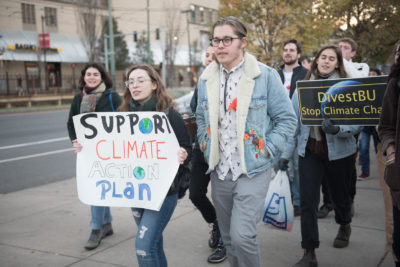
Scientists are increasingly omitting the term “climate change” in public grant proposals to avoid funding cuts from the Trump administration, according to a recent NPR analysis — a trend some Boston University researchers said they have noticed.
An analysis of National Science Foundation grants awarded in 2017 revealed a 40 percent decrease in the use of the term “climate change” and an increase in replacement phrases like “extreme weather” and “environmental change,” according to the NPR report.
The recent trend of using euphemisms for the term “climate change” can in part be attributed to the skeptical approach the Trump administration has taken toward environmental science issues and research, some researchers said. The NPR article notes that climate change was the only research area singled out by name for reduction in Trump’s budget proposal.
Michael Dietze, a professor in BU’s earth and environment department, explained that although research spending has been restricted for scientists for over a decade, this administration has been the first to target work on climate change by cutting funding for specific programs.
“It wasn’t a minor cut — whole programs were zeroed out in the budget across multiple agencies,” Dietze wrote in an email. “In some instances Trump’s proposed budget increased spending in other areas so that the total budget of a specific agency does not change.”
Dietze also explained that he has not yet seen direct political interference in how agencies distribute grant funding, but fear of political bias has caused scientists to resort to euphemisms instead of being outright about their efforts to study climate change. Because of that fear, he wrote, the trend of omitting the term “climate change” in public grant summaries is likely to increase.
“There’s every sign that it will get worse,” Dietze wrote. “Many of the grants awarded in 2017 are based on proposals written in 2016 before the election — what we’re seeing now may be the tip of the iceberg.”
Mark Friedl, professor and interim chair of the earth and environment department, said he has discussed the omission of the term “climate change” in public research with his colleagues, but he feels the greater issue is “decreased funding and support for science and research in general.”
“There has been discussion about this among the [earth and environment] faculty,” Freidl said. “The current administration and Congress [don’t] seem to place any value whatsoever on this notion of science as an important element of society.”
Friedl said the best thing research institutions like BU can do in response to this trend is to “just keep doing our science and keep providing that clear, empirical, sensible evidence of what we see is happening on the planet.”
“The choice of a single word isn’t really what dictates the merit of a proposed science project,” he said. “The best thing we can do is to keep working on doing good science and objective science and defensible science, and in the end, truth will prevail.”
Curtis Woodcock, a professor in the earth and environment department, wrote in an email that he thinks “there have been budget cuts in areas related to climate science, and I expect
they are likely to continue — and yes it is bound to impact things at BU.”
Several BU students said they sympathize with researchers who choose to exclude terms like “climate change” in order to maintain their funding from the federal government.
Adrienne Cabral, a sophomore in the College of Arts and Sciences, said she thinks omitting the term “climate change” in research studies might suggest the topic isn’t important.
“Climate change is such a prevalent issue that we really cannot ignore it,” she said. “I think that it would really impede research to pretend like it’s not a big problem.”
Cabral added she largely blames the president of the United States for creating an environment where researchers and organizations feel inclined to avoid certain terms to secure funding.
“I don’t know if it necessarily is the fault of those publications because they do need to hold onto their funding,” Cabral said. “Otherwise, they aren’t able to report at all, so I don’t really blame them. I blame Trump for that.”
Jessica Peters, a senior in the College of Engineering, said she feels the omission of the phrase “climate change” is a moral issue.
“I can see how they could tailor their research to have more funding,” Peters said. “It is morally wrong just in terms of the science behind it, just because again, science is fact, and omitting facts is not doing your report justice.”
Michael Ward, an ENG alumnus and a graduate student in the School of Education, wrote in a text message that he thinks the phrase “climate change” has become a buzzword that attracts media attention.
“Phrases like ‘environmental changes’ and ‘extreme weather’ are essentially synonymous to the phrase ‘climate change,’ so I don’t think that there is any dishonestly with replacing that buzz phrase,” he wrote.
Ward said he thinks climate change researchers should avoid using the phrase if it means they can continue their research.
“If it allows research to continue, that’s more important than [using] that one phrase,” he wrote.























































































































